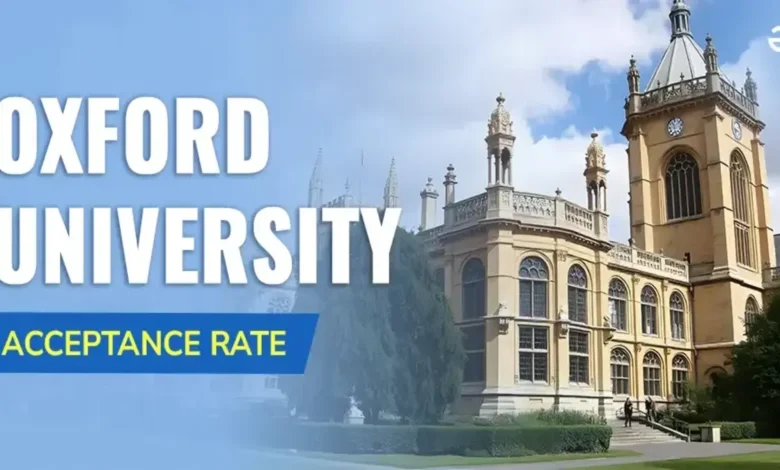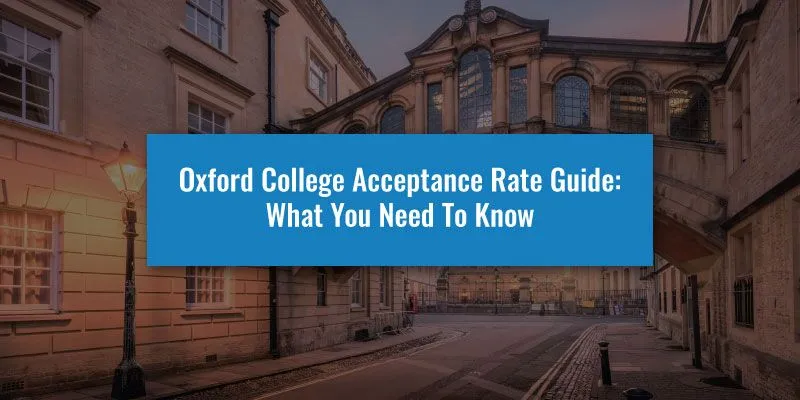Oxford University Acceptance Rate: Everything You Need to Know

Oxford University, one of the most prestigious academic institutions in the world, draws thousands of applicants each year from around the globe. However, with its exceptional reputation for educational excellence and rigorous standards, it is also known for its highly competitive admissions process. Many students, whether aspiring to study humanities, sciences, or social sciences, are curious about Oxford University’s acceptance rate and how it impacts their chances of acceptance. This article will provide an in-depth analysis of the acceptance rate, factors that influence it, and practical tips to boost your chances of getting into this esteemed institution.
What is Oxford University’s Acceptance Rate?
Oxford University’s acceptance rate is a crucial factor for anyone considering applying. This rate varies slightly from year to year, depending on various factors such as the number of applicants and the number of available spots. However, the acceptance rate at Oxford University is generally quite low, which is a reflection of the immense demand for a place at this institution.
Oxford typically receives a high number of applications each year, with over 20,000 students applying for undergraduate courses annually. The acceptance rate hovers around 17 to 18 percent, making it one of the most selective universities in the world. This means that, on average, less than one in five applicants will be offered a place.
However, it is important to note that this figure is only an approximation. The acceptance rate can vary depending on the course you are applying for. For instance, highly competitive courses like Medicine, Law, and Economics tend to have even lower acceptance rates, with some courses admitting less than 10 percent of applicants. On the other hand, less competitive programs may have slightly higher acceptance rates.
While the acceptance rate provides an overall picture of the competition, it is important to consider the specifics of the program you are applying for, as certain courses may have higher or lower chances of acceptance.

The Admission Process at Oxford University
Understanding the admission process at Oxford University is essential if you want to improve your chances of acceptance. The process is complex and demanding, reflecting the academic rigor and expectations associated with studying at one of the world’s leading universities. The admissions process includes several stages, each of which is designed to assess the suitability of applicants for the specific course they are applying to.
Step 1: Choosing a Course and College
Before applying to Oxford, it is essential to decide which course you would like to pursue. Oxford offers over 300 undergraduate courses, spanning subjects in the humanities, sciences, and social sciences. The choice of course is critical, as it will determine which colleges you can apply to, as each college offers different courses. You must also choose the right college to apply to, as each college at Oxford has its unique selection criteria.
You can apply to one of Oxford’s 39 autonomous colleges, and each college has its own admissions process, which is coordinated alongside the central university system. The college you apply to is important, as each has its strengths, culture, and specialisms. While you can list your preferred college on your application, the university does allow you to apply for an open application, meaning you will be assigned to a college if your application is successful.
Step 2: The UCAS Application
All applications to Oxford are made through the UCAS (Universities and Colleges Admissions Service) system. The UCAS application is a standardized application form used by all UK universities. As part of the application process, you will need to submit personal details, academic qualifications, a personal statement, and a reference letter. The deadline for submitting your UCAS application to Oxford is typically in October, well ahead of the standard UCAS deadline, which is in January.
Step 3: The Oxford Admissions Test
In addition to the standard UCAS application, many courses at Oxford require applicants to take an admissions test. These tests are designed to assess the academic abilities and potential of applicants in relation to their chosen subject. Some tests are specific to the course, such as the Law National Admissions Test (LNAT) for law applicants or the Oxford Physics Aptitude Test (PAT) for those applying to physics courses.
These tests are an important component of the admissions process, as they allow the university to assess applicants on their subject knowledge and critical thinking abilities, often before interviews take place. Preparing for these tests is essential, as a good performance can significantly improve your chances of securing an interview invitation.

Step 4: The Interview Process
The interview process is perhaps one of the most daunting aspects of applying to Oxford University. If you perform well in your application, including the personal statement and admissions tests, you may be invited to an interview. The interview is a key part of Oxford’s assessment process, as it allows admissions tutors to engage with applicants and evaluate their intellectual potential and suitability for the course.
Interviews at Oxford are typically conducted in December, and the format can vary depending on the subject. In general, you can expect to be asked challenging academic questions that test your ability to think critically, apply knowledge, and engage with complex problems. For some courses, there may also be a practical component, such as solving problems or demonstrating skills related to your field of study.
Interviews are stressful, but they are an opportunity to show your enthusiasm, academic abilities, and potential for success at Oxford. It’s important to remain calm and confident during the interview and to take time to think through your answers. Being well-prepared for the types of questions you may be asked can help you perform well.
Step 5: The Decision
After the interview process, Oxford’s admissions team will review all applicants and make their decisions. Successful candidates will receive an offer of admission, which may be conditional on achieving certain grades in their A-levels (or equivalent qualifications). Offers can also be made to candidates who have demonstrated exceptional academic potential but did not meet all of the entrance requirements.
If you are not offered a place, you may still have the opportunity to be placed on a waiting list in case spots become available. Additionally, Oxford occasionally offers deferred entry for students who wish to take a gap year before starting their studies.
Factors That Influence the Oxford University Acceptance Rate
While the overall acceptance rate at Oxford University gives a broad view of competitiveness, many factors play a role in determining whether or not an applicant will be successful. Understanding these factors can help you maximize your chances of securing a place at Oxford.
Academic Qualifications
One of the most important factors in the Oxford admissions process is the academic qualifications of the applicant. Oxford University has high academic standards, and prospective students are expected to meet certain grade requirements. For undergraduate courses, applicants are typically required to have top grades in their A-levels or equivalent secondary school qualifications. The specific grade requirements depend on the course, but most courses require A*AA or AAA grades.
Applicants who meet the academic requirements for their chosen course are more likely to progress to the next stage of the application process, whether that be taking the admissions test or attending an interview. That being said, Oxford is looking for students who have demonstrated not only strong academic achievements but also the intellectual curiosity and drive to succeed in a challenging academic environment.
Extracurricular Activities and Personal Statement
Although academic qualifications are the primary focus of the admissions process, extracurricular activities, and personal statements can also play a role in influencing the decision. A strong personal statement that highlights your enthusiasm for the subject, relevant experiences, and your academic achievements can help set you apart from other candidates.
While extracurricular activities are not mandatory, they can demonstrate your commitment to learning, leadership skills, and other qualities that Oxford values in its students. For example, if you are applying for a history degree, involvement in historical research, debates, or relevant volunteer work could show that you are passionate about the subject and committed to developing your skills outside of the classroom.
The Interview Performance
As mentioned earlier, the interview is a crucial part of the admissions process at Oxford. It provides a final opportunity for the university to assess your suitability for the course and your ability to handle academic challenges. Performing well in the interview is often a decisive factor in securing a place at Oxford.
Admissions tutors are looking for candidates who not only possess academic potential but also show that they are intellectually curious, open-minded, and able to think critically. During the interview, it’s essential to be prepared for challenging questions and to engage with the tutor thoughtfully and reflectively.
How to Increase Your Chances of Acceptance to Oxford University
If you’re determined to study at Oxford, there are several strategies you can use to increase your chances of acceptance. While getting into Oxford is challenging, it’s not impossible. By preparing thoroughly and understanding the admissions process, you can present yourself as a strong candidate.
Focus on Academic Excellence
First and foremost, you must prioritize your academic performance. Aim for top grades in your A-levels or equivalent qualifications, as Oxford sets high academic standards for its applicants. Keep in mind that you will need to demonstrate not only your academic abilities but also your enthusiasm for the subject you wish to study.
Additionally, take every opportunity to engage with your chosen subject outside of the classroom. This could involve reading widely, attending relevant events, participating in academic competitions, or conducting independent research. These experiences will not only enhance your understanding of the subject but will also strengthen your statement and interview responses.
Prepare for the Admissions Test
Many courses at Oxford require applicants to take an admissions test, so it’s essential to prepare well for this stage of the application process. Familiarize yourself with the format of the test and practice answering sample questions. Consider taking practice tests and using resources that will help you improve your problem-solving abilities and analytical skills.
Don’t leave test preparation to the last minute. Start studying well in advance to ensure that you feel confident on the day of the test. This preparation can make a significant difference in your chances of receiving an interview invitation.
Hone Your Interview Skills
As the interview is such an important part of the admissions process, it’s vital to prepare thoroughly. Research the types of questions commonly asked for your chosen course and think about how you would approach them. Practice answering questions out loud with a teacher, mentor, or family member to get comfortable discussing complex topics in a structured way.
During the interview, focus on demonstrating your critical thinking skills, curiosity, and passion for the subject. Take your time to think before answering and don’t be afraid to ask for clarification if you don’t understand a question. Remember, the interview is as much about the thought process as it is about finding the right answer.
Conclusion
Applying to Oxford University is a rigorous and highly competitive process, but with the right preparation and mindset, you can increase your chances of being accepted. While the overall acceptance rate is low, it’s important to remember that this reflects the high demand for places and the university’s commitment to maintaining exceptional academic standards.
By focusing on academic excellence, preparing for the admissions test, crafting a strong personal statement, and practicing for the interview, you can enhance your prospects of securing a place at Oxford. While getting into Oxford may be challenging, it’s a journey that, with dedication and hard work, can be achievable for those who are passionate about their chosen field and committed to academic success.






